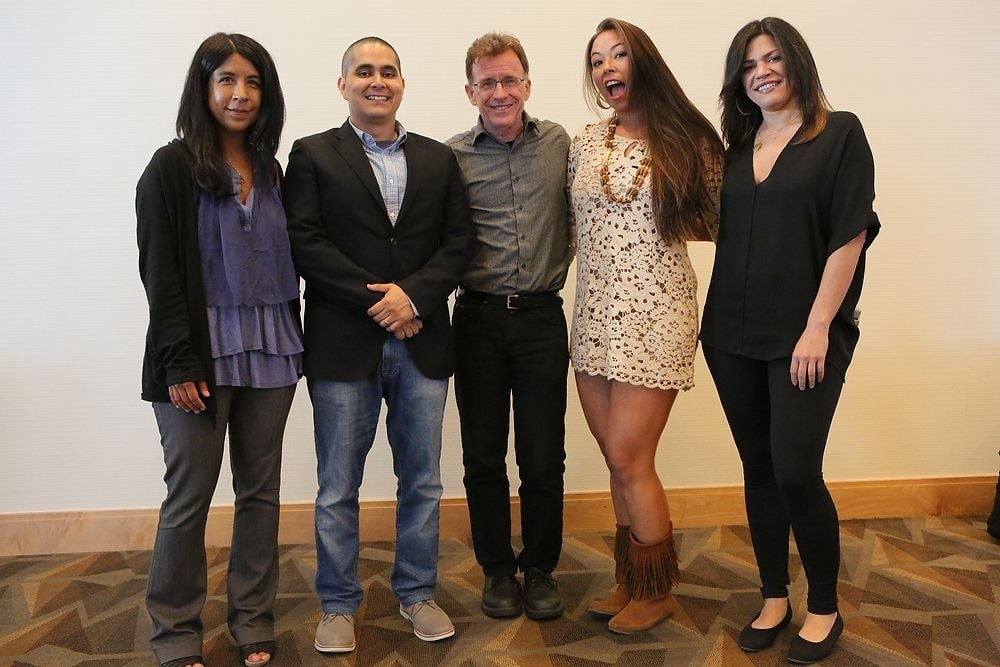From June 19–21, AT’s parent company, Theatre Communications Group, held its 24th annual national conference, titled “Crossing Borders.” AT recapped the opening plenary, “To the Mountaintop” on Thursday, June 19, 2014.
Perhaps the statement that received the most applause at Thursday afternoon’s plenary (not to mention retweets well into the night), and was even repeated twice by the speaker, was, “If it isn’t in the budget, it’s just talk.” Delivered forcefully by Peter Brosius, artistic director of Children’s Theatre Company in Minneapolis, the statement referred to the topic of diversity and inclusion–and to the tendency of well-intentioned people to talk a good game, or to await special funding, rather than to make these a bottom-line priority.
The session, titled “To the Mountaintop,” referred to the speech that Dr. Martin Luther King Jr. gave in Memphis hours before he died, in which he said, invoking Moses, “I’ve been to the mountaintop….And I’ve looked over. And I’ve seen the Promised Land.” In this session, the promised land was a land of a more equitable, diverse, just, and inclusive American theatre, not only onstage but in the boardrooms, the seats, and the larger world. The topic at hand, as Brosius’s quote put it simply, was not just talk of wanting to get to this land, but models for how to get there.
Penumbra Theatre co-artistic director Sarah Bellamy introduced the four plenary speakers, as well as the “mountaintop” theme, saying that diversity is essential not just for attracting new audiences or increased ticket sales but because it is simply “the right thing to do.”
The first speaker up was playwright Kristoffer Diaz. He spoke fondly of Mixed Blood’s artistic director Jack Reuler, whom he called “gangster as fuck” for introducing the Radical Hospitality program his company in Minneapolis. Famously, Reuler eliminated ticket prices for all Mixed Blood shows, as proof of risk-taking in the name of inclusivity that has paid off in spades. Diaz also gave a tidy three-point plan for fostering diversity:
1) “Decide that you want your season to be awesome”
2) “Be a home for your artists”
3) “Promote and support your artists. Ask them what they need, not just as artists but as people. We need a lot of things, because we have made a terrible career choice.”
The second speaker was photographer Matika Wilbur, whose sobering account of her Project 562 prompted rapt silence in the room. In Project 562, Wilbur (of the Tulalip and Swinomish Native American tribes) sold all of her belongings to go and photograph every tribe in the U.S., as a way to combat the stereotypical images of Native Americans in the media (Johnny Depp’s turn as Tonto in the recent Lone Ranger film being just the most prominent example). “When society only sees us through these images, it means that our modern issues don’t exist,” she explained. She also noted something from one of the subjects she photographed, that in Apache, “There’s no word for another race except ‘chiquee,’ meaning we are all relatives.”
Next was playwright Naomi Iizuka, who used University of California-Santa Barbara’s Summer Theatre Lab and the Big Ten Conference Playwriting Initiative as models for fostering newer, more diverse voices. For example, the latter is a multi-year commitment among 10 universities to commission and produce works by women. “If we want a more equitable, inclusive and diverse theatre, we need less rhetoric and more problem-solving…. If we genuinely want an inclusive theater, we must seek out plays by writers from underserved communities and produce them,” she said. “I believe universities are a huge untapped resource.”
The final speaker was Brosius, who spoke about attracting young people to the theatre and how ACT One, his theatre’s initiative to address the various barriers that might be keeping those audiences from the theatre, including economic or educational disparities, and mitigating them. He also provided a handy tidbit about Minnesota governance: Arts funding is built into the state constitution. As such, “We receive public funds, we have public responsibilities, including equity and social justice,” he said.
In addition to the speakers above, TCG executive director Teresa Eyring made some opening remarks about TCG’s ongoing diversity and inclusion initiative, including the newest component, REPRESENT, a self-selecting survey that will allow TCG to get a detailed view of the demographics of theatre makers across the country. And Christopher Ashley, artistic director of the local La Jolla Playhouse and part of the host committee, welcomed the audience to the close-knit San Diego theatre community, which, he joked, is “bonded by a common enemy: the beach.”
Two awards were given out. The Regional Funder Award was received by Lorie Zapf, San Diego city council member who pointed out that though arts funding had been cut from the city’s Arts and Culture Commission, it was restored in 2013 with 72 organizations receiving money. “In order to have a great city, you have to have a great arts and culture community,” she said in her speech. And Liesl Tommy, in her acceptance speech of the Alan Schneider directing award, sincerely but pointedly thanked the “gentlemen” who helped her establish her career. Tommy was raised in South Africa and spoke directly to the issue of diversity and being a female artist, telling the artistic directors in the room to “change your ways. Do not be like the Republican Party trying to ignore us and thereby fossilizing yourselves.” Rallying those present as stirringly as the Navy Band Southwest that opened the plenary with the national anthem, Tommy said, “Be the leaders that the next generation thanks in their speeches.”


